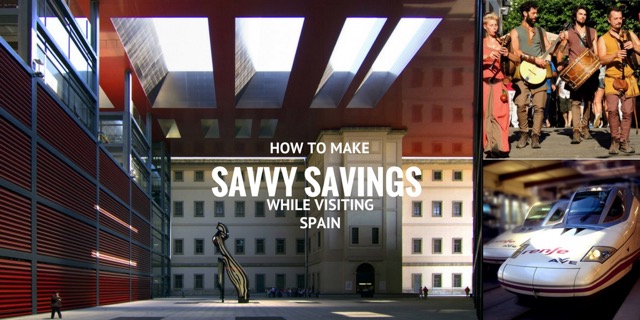Here at Totally Spain, our clients have been known to ‘splash out’ on certain things when travelling in Spain but these treats are always offset by money saving deals to get them a bit more bang for their buck. After two decades designing itineraries throughout Spain and Portugal, we really know a lot about providing great value for money and here are some of our favourite money saving travel pro-tips in Spain which we encourage you to try out!
Money Saving Travel Tips in Spain – 12 Insider Savvy Savings!
1 Pro-tip: Hotels
The biggest outlay of your trip (unless you have a second home here) will be your accommodation but we have lots of tips to save on hotels. Without wanting to blow our own trumpet – we amaze our own friends and family (not to mention our clients) with the deals we come up with. That’s what happens when you work in the same business for 16 years and build up great contacts. Our greatest tip is to avoid travelling in July and August which is the peak season for Spain’s hoteliers. If you must travel then, avoid the hotels on the coast and choose the inland locations such as Seville, Granada, Cordoba or Madrid where it’s low season. It will be hot but everywhere has A/C and many restaurants are now using outdoor ‘misting’ systems to keep you cool as you relax over your leisurely lunch in a shaded square after a long morning touring.
And whenever possible try to book for longer stays in less places – as the hotels many be able to provide you with 4 nights for the price of 3 etc. Hotels also love people who stay on Sunday nights which is the quietest night of the week for them so if you have flexibility, make use of this! Planning ahead often means you can negotiate little extras. Try to talk with the venue if you’re not getting anywhere and react to any information they give you. For example if they advise you there is zero availability because there’s a huge conference on it town, then try to re-shuffle your dates. Of course, if you arrange a custom-trip with us at Totally Spain, we will already take these things into account for you and highlight when it is best to stay in each location.
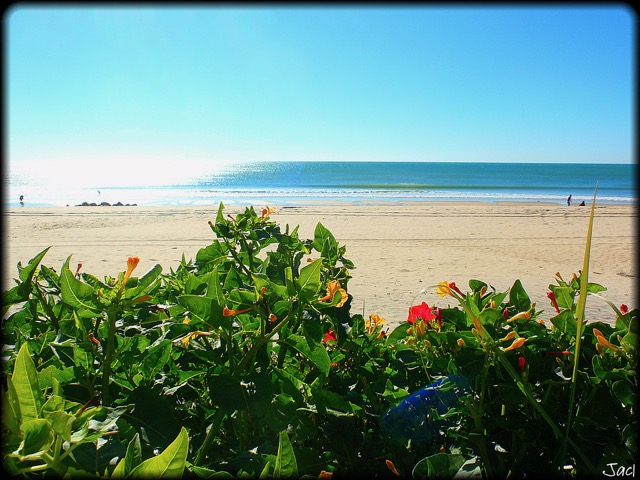
If you avoid July and August, you can look forward to these empty beaches and cheaper hotel rates also! photo credit: Matalascañas (Huelva) via photopin (license)
2 Pro-Tip: Eating Out
After hotels, meals out are probably your biggest expense. Although Spain is a relatively inexpensive place to dine out, there are lots of ways to guarantee you are not paying over the odds. If you have a buffet breakfast included in your hotel – make use of it! It’s really handy for kids who tend to enjoy the vast range on offer and it’s useful if you are going out hiking or walking and want a hearty breakfast. But if you are traveling as a couple and can book a ‘room only’ rate, you have a nice continental breakfast in a local Spanish cafe or bar for an average of 3 euro or less. Even if you are in a rural location, your hotel will nearly always be able to prepare a coffee and croissant for a fifth of the price of a buffet breakfast.
When it comes to lunch and dinner, it pays to research a bit. Don’t expect to find a great restaurant in the town’s Plaza Mayor– but chances are that just one street away, you’ll find lots of options that are targeted at local office workers which will be better value and generally more authentic too. Remember it’s always cheaper to eat out in the middle of the day in Spain than at night. That’s when there is most competition amongst restaurants. Check out the chalkboards outside and see whether the places are busy inside. We often do a quick online search for “menu del dia” and the name of the place we are going to e.g. “Toledo” to pick up some ideas on new places to eat. The ‘menu-del-dia‘ is a three-course set price menu with wine that offers a decent selection of dishes and can cost on average 12 euro. Read our post all about this here. Bear in mind that not only are the prices more competitive but portion sizes are much larger during the day – the Spanish don’t tend to serve large portions at night because most of their diners have already eaten their main meal.
Another way to save money is to share courses. Instead of being frowned up, the Spanish love doing this as it’s a way of sharing the experience. Read our guide on Sharing Food in Spain where we explain ‘raciones’ which are like large tapas that are perfect for sharing. We also cover ‘platos combinados’ which are inexpensive single-portion dishes for those who positively don’t want to share!
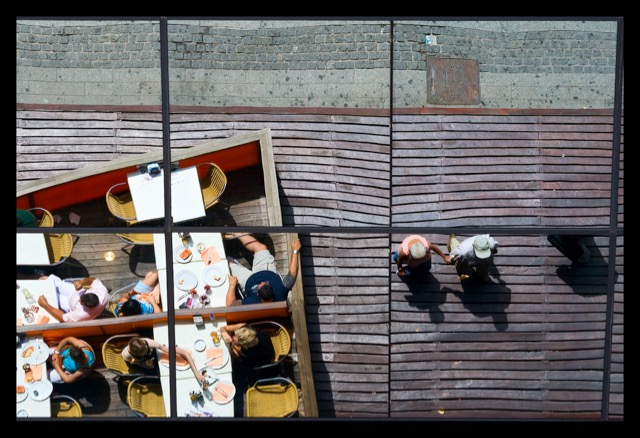
You’ll find better value if you eat your main meal at lunchtime. photo credit: The Space Continuum (is not so continuous) via photopin (license)
If you prefer to pre-book a table than doing your research on foot, we use El Tenedor.com and Restaurantes.com to check for special deals and offers. Tenedor often has 30-50 percent discounts so it’s well worth a browse. And we always check the fine dining guides for towns and cities. Remember the Michelin guide lists a huge number of excellent restaurants without Michelin stars that you’d never find while wandering around on foot.
3 Free Tapas & Tapas Deals
If you do find yourself walking about trying to find somewhere, keep an eye out for the very economical “tapa+bedida” combination (called Pinchopote in the North of Spain. Read about that in our Guide to San Sebastian.) The two Spanish cities of Granada and Leon are famous for their free tapas but don’t be surprised if you come up trumps in Madrid, Salamanca, Segovia, Alcala de Henares, Avila, Almeria, Badajoz and Jaen. Free tapas tend to be basic e.g. a plate of ensaladilla (Russian salad) with some breadsticks, some chunks of tortilla, a few slices of chorizo and of course the delicious olives. You’ll generally need to pay to get some elaborate dishes.
4 Pro-Tip: Tipping
Remember you do not leave to need large tips in Spain. Small change is usually fine.
5 Pro-Tip: Transport
Transport can be expensive in some European countries but in Spain, you’ll find taxis, trains and buses are all inexpensive. If you are staying in a city for a few days, ask about ‘bonos’ which offer discounts for multiple trips.
Car hire can often be a large expense on a holiday but because this is such a competitive marketplace you’ll find relatively good value for money. Bear in mind that manual shift is considerably cheaper than automatic. If you are looking for something a bit different, whether that’s a classic car or a Mercedes van, you’ll have less choice, so make sure to book ahead. Remember, the car-hire firms make their money from the extras – so whenever possible bring your own SatNav, child car seats etc. and don’t add extra drivers to the insurance policy unless you know they will be driving. Consider taking out your ‘excess’ insurance coverage online rather than directly with the rental company. Some of our UK clients have booked third party excess insurance with Questor and we’re sure there are other deals available online. Also remember (and this goes for everywhere in Europe) to photograph the vehicle before you drive it. And make sure the car-hire paperwork indicates all bumps or grazes on the body-work as you will be charged if you don’t highlight it to the rental office before you pull away. Read more tips in our guide to driving in Spain & Portugal.
6 Pro-Tip: Parking
If you are on a self-drive holiday, remember that parking will be an extra in most inner-city hotels, probably about 20 euro per night although 24 hours parking at the Plaza de Espana in Madrid is now 33 euros. If you are spending a few days in the bigger cities and won’t be using your car, it may be cheaper to return it than park it. For the smaller cities, it might make sense to choose hotels outside the old quarter, not only because the parking is more expensive but many of the streets are pedestrianised too so it can be a bit of an ordeal to get to the place. If your hotel has no car park, check whether they have a special agreement with a public carpark nearby and be sure to get the hotel to stamp your ticket.
When you are out during the day touring, our advice is to always park in a public carpark. Most of Spain’s towns and cities operate a metered parking system that only allows parking for two hours at a stretch. If you don’t get back in time to pay the meter, you could find your vehicle has been towed away and it can cost a couple of hundred euro to be released from the municipal car pound. If you are doing a lot of mileage, you can check fuel prices and plan your pit-stops here. Again, you can read more tips in our guide to driving in Spain & Portugal.
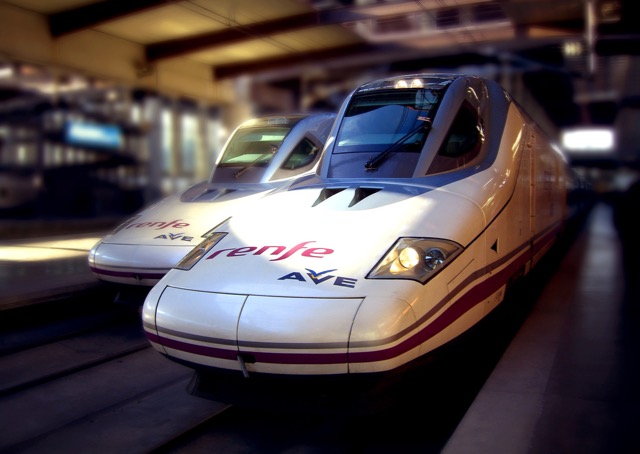
This high-speed AVE can save you quite a bit of time and money getting around Spain. photo credit: ave via photopin (license)
Remember that high-speed trains offer great value over long distances in Spain and can save you a lot of time too – so make sure to check out the AVE connections before planning your trip. For example you can travel from Madrid to Barcelona in just 2hr30mins compared to a minimum of 6 hours by car. Read our post about sightseeing in Spain on the high-speed train network.
7 Pro-Tip: Museums
Entrance fees to museums can also be a drain on the pocket. Here’s where you should research museum passes and tourist passes as all the main Spanish cities have them. You should also check out whether the museums you are interested in are free on a particular day or time. Why pay when you don’t have to, right?
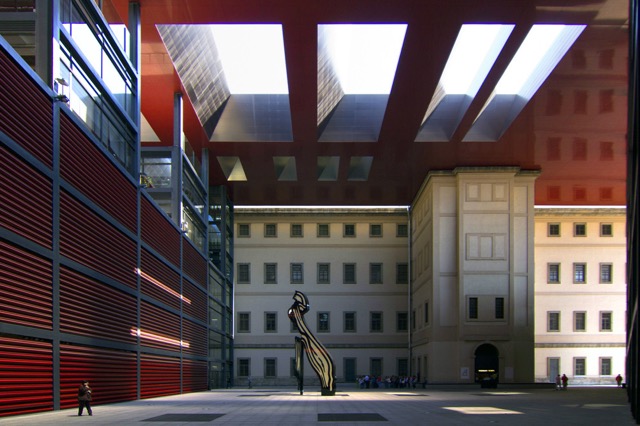
The Reina Sofia museum is free from 7-9pm and on Sunday afternoons. It’s worth checking times at each museum you want to visit! photo credit: Reina Sofia Museum Extension via photopin (license)
8 ProTip: Tour Guides
We always recommend getting a tour guide when visiting the bigger monuments. It seems to make the visit that little bit more special or personal. Some of the museums offer guide tours for just a little bit more than the entry fees and some are even free with the entry ticket. Always take these tours which always highlight the key works or exhibits even if you have a guide book. If you have booked a private guide – make sure to strike up a rapport with the person – it makes it much more fun for both parties. And when the visit is coming to an end, you’ll find your guide is always keen to provide some extra advice – whether that’s where to go for a coffee or the best place to take pictures outside or even the nicest restaurant or square near the museum. If they have had a chance to get to know you – they are in a better position to recommend what you would like to see afterwards. These tips are priceless in a new city! Of course, if you arrange a custom-trip with us at Totally Spain, we will highlight all the great free tours available and suggest when its makes sense to hire one of our private guides.
Our golden rule, whenever we are exploring even the tiniest of hamlets and villages, is to ask for recommendations whenever you go. New bars and restaurants open every day and who knows – you could be right beside a brand new Michelin-star in the making but not know about it. And when you are given a recommendation – always say you were sent. Chances are you’ll be treated that little bit better – perhaps a free tapa – or a liqueur on the house after lunch – but even if it doesn’t translate into anything more tangible than a smile, that’s nice too.
9 Pro-tip: Shopping
If you like to bring back gifts from your holiday, our advice is to shop before you go to the airport. You’ll find that most food markets and delis will be able to prepare wonderful selections of the best jamon, cheese and wine; all vacuum-packed for you. This is also a great idea if you don’t fancy eating out at night –nip into any run of the mill supermarket to pick up some crusty bread at a bakery and some hunks of cheese, a few cured meats and a bottle of wine (you’ll be amazed at the prices) and you’re sorted!

How much nicer is it to pick up your food gifts at a food market – and cheaper too! photo credit: Fine ham via photopin (license)
If you are looking for other inexpensive gift items, we always recommend the many great museum shops, leatherwear, shoes, wines, sherries and cavas, inexpensive ceramic tiles, packets of saffron and tins of smoked paprika (Pimenton de la Vera). Remember, before you check in your bags at the airport – be sure to claim your tax back from any gift shopping at the airport! You have to do it before dropping in your bags as customs officials need to be able to see the products purchased. You’ll find lot more advice in our guide to shopping Spain here and our guide to the best gifts here.
10 Pro-Tip: Medical Insurance
One tip we hope you don’t have to use, but it’s worth doing if you are a resident of the EU, is to get your free EHIC (European Health Insurance Card) which allows you access to the excellent public health system that operates here in Spain. It’s not a substitute for medical or travel insurance (which you should also take out), but it will make any contact you may need with the health system here a lot smoother as EHIC cardholders are provided treatment on the exact same same terms as Spanish nationals. We also cover medical insurance in our travel checklist which you can read here.
11 Pro-Tip: Find the Fiestas
You probably don’t need us to tell you that Spain is famous for its festivals – every village and town throws a few big parties every year and everybody is invited. Spanish people tend to live in small apartments so everyday life is lived on the streets. The town halls plan around this and not only provide more benches than you’ll find anywhere else – but chances are you’ll find there’s a festival or fiesta during your stay. This might involve live music plus some free food which could be a giant paella, grilled sardines on a BBQ or chocolate and churros for everyone. It’s not just about saving a few euro – it’s about sharing the moment with everybody around you – knowing you are experiencing something you couldn’t do anywhere else. Make sure to ask your Totally Spain representative or visit your nearest tourist office when you arrive to ask what local fiestas are happening in your area.
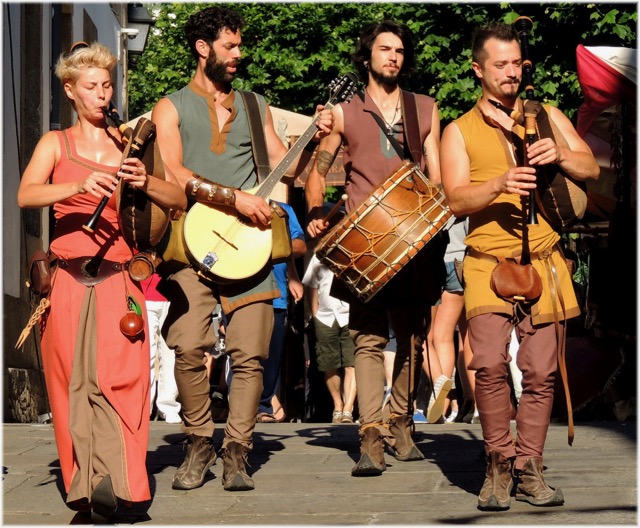
Go into your tourist office to check what festivals are on in the area. photo credit: 3900-Feira Medieval na Cidade Vella Coruñesa. via photopin (license)
12 Pro-Tip: Avoid Costly Bank Charges
The final item is about banking fees and changing currency. Our advice to clients is to take money from ATMs as the exchange rate is usually the cheapest and most up to date. But before you travel check whether your bank charges a fee for making cash withdrawals in Spain. Some do and some don’t, for example, we are aware of the reciprocal arrangement between Bank of America and Deutsche Bank in Spain. Get onto your bank and ask whether it charges fees on purchases made in Spain and withdrawal fees on ATM usage in Spain. Check the fees on credit and debit cards because one is bound to be different to the other.
So there you have it – our guide to savvy savings in Spain. We hope our many years of experience in travel planning can help you plan a thrifty trip to Spain. Just imagine the savings you could make if we planned a trip together…
